---------------------------------------------------------
Ducks are very intelligent animals with complex social relationships. This is part of what makes keeping ducks so interesting and so rewarding! Let’s take a look at some of the most common questions about duck behavior and the reason behind them
Duckling Imprinting
Young ducklings imprint on whatever and whoever they spend time with in those first few precious hours of life. It’s often their mother or siblings, but if you are hatching ducklings in an incubator it could be you! When a duck imprints on you, she will want to follow you around and be with you all the time.
This is something you might want to give some thought to. While it sounds fun to have a duck imprint on you, you should also think about the long-term happiness of the duck. Ducks need nearly constant companionship. Another duck is really the ideal companion for a duck. If you work or go to school outside the house you should not get a single duck. If the duck is destined to live outside in your yard, you should not get a single duck.
Will she get over it when she is fully grown, she moves outside and can’t be with her all day? Yes, but she will be sad and no one wants a sad duck! It’s best to raise ducklings in a group. Letting them imprint on a “sibling” will give them a friend to hang out with when you aren’t around. It doesn’t mean the ducklings won’t love you. It just means their entire world doesn’t revolve around you, which in the end is better for the duck. Click here to read more about raising ducklings
Eating & Drinking
It’s no secret that ducks loves water, but did you know they shouldn’t have food without water? You might notice that your ducks like to grab a bill full of food and then dunk it in the water, going back & forth between the two. They aren’t just doing it to make a big mess or to waste food. Ducks need to dip their food in water to digest it. If they eat feed without water, the dry feed just sits in their crop. When they drink again, the food will swell up and possibly choke them. click here to read more about feeding your backyard ducks
Flirting
Ducks are very flirty! To flirt, drakes will rise up out of the water shaking their tail and head. They flick water, or play nip (like a grade-schooler poking at the girl he likes on the playground). They will swim around with their neck outstretched. Both males and females will bob their heads up and down at each other to flirt. Females flirt by flattening their bodies out in the water in a mating pose.
Drakes & Mating Habits
While all this duck courting & flirting seems sweet & romantic, the process of duck mating can be anything but, surprising many new duck owners. Ducks will usually mate in water, but will also mate on land. In the water, it is easier on the female’s legs & back and minimizes the chances of her getting hurt. The female flattens out like a surfboard and the male climbs on her back. He grabs the back of her head/neck with his bill to help him balance.
Sometimes a drake can pull out the feathers along the back of the female’s neck and even cause her to bleed while trying to find his balance or while keeping her from running away. Sometimes it can look like he is trying to drown her, dunking her head in the water repeatedly. Groups of males have been known to gang up on a female. It all seems harsh but unfortunately is normal mating behavior for ducks. It is important to not insert human emotions & relationship expectations into your duck’s relationships with each other.
Male domestic ducks are not monogamous. They will pick out their favorite female and will spend the most time with her. He will probably be the nicest to her. He might bring her treats or hang out with her while she lays her egg. But he will mate with any female he has the opportunity to. The females will pick out their favorite male. That is likely to be the only one she will voluntarily mate with. But a female’s favorite can change, it is not a lifetime preference.
Drake Behavior
By far the questions I get the most often center around male duck behaviors. I’ll just put it out there now – male ducks can be jerks sometimes. Obviously, I am speaking in general, some of them are very sweet. I am not sure how they act if they are the only duck living in the house as pet, my experiences are only with them living in a group. Female ducks are happy to have lots of female duck friends and share the pool and food and bugs and shade tree. Add a male into the mix and things get complicated.
For about half the year, drakes are pretty chill and generally nice. Mating season is another story (mid February – mid July in the northern hemisphere). Their hormones go into overdrive. They become territorial. If you keep multiple male ducks you could have some fighting to see who is alpha. They mate and mate and over mate. Female ducks can even be killed by males’ overly amorous tenancies. He will not let new ducks into the area easily, and might even chase off & kill his own offspring if he thinks they are taking up too much of the female’s time.
When my drakes see a female in the pool, they run as fast as possible thinking it is an invitation. The females generally run for the hills because they have had enough of the male nonsense and just wanted to splash in the pool. The boys will guard the pool and wait.
We have multiple drakes here on the farm. They are all nice to humans, never challenging us or trying to attack any of us. They are nice to the chickens (although the presence of our roosters probably helps that). But sometimes I have to put the males in time out (locked alone in part of the run) for a day or two because they aren’t giving the female ducks a moments peace, or if one of the females has been injured. It is recommended if you have a drake, you should have at least 3-4 female ducks per drake to keep them…busy.
The female behavior will also change when there is a drake present. They become less welcoming to new ducks because while drakes are not monogamous, female ducks have their favorite mate and they don’t really like sharing. The head duck will usually be the one that sticks closest to the drake all day. If you have multiple drakes, each drake will usually have a “head wife” that he hangs out with most and is the nicest to. But that won’t stop him from mating all the other ducks on the farm. The females won’t interfere in the mating but she will be sure to let the other females know this is her man.
So why keep a drake?
They are beautiful with all their colorful plumage. You have a free source of baby ducklings by hatching out fertilized eggs. He will protect the females from danger.
It can be difficult to determine the sex of ducklings so many times people just end up with a drake by mistake (this is how we got all of ours). It doesn’t mean you need to rehome him or eat him. Just be patient with his personality quirks, and keep an eye out that he isn’t hurting the females. Click here to read more tips about dealing with drakes’ behavior
Other duck behavior – why does my duck………
Tilt their head?
Ducks can give a mean side eye, but why are they staring you down?? Duck eyes are actually fixed in the socket, meaning to see in different directions they have to actually tilt & move their head around. So they aren’t giving you a side eye, they just want to get a better look. You can especially notice this when they tilt their head sideways to scan the sky for flying predators.
Walk in a line?
This is also related to their eye placement. With the lead duck keeping an eye to the front, the ducks behind can be scanning from side to side allowing them all to stay safer from predators. When my ducks are crossing the yard, 9 times out of 10 they are walking in line in a little duck parade.
Wag their tail?
If your duck has just taken a swim, they will give themselves a shake to dry off usually ending with a good tail shake. But I have also seen ducks shaking their tails when they are excited, like when I am filling up their pool or they are waiting for a tasty treat from the garden. It reminds me of my dog when she is super happy and excited!
Blow bubbles in their water?
This always cracks me up! Sometimes you will see a duck dip their head in the water and forcibly breathe out, blowing bubbles into the water. They are cleaning out any dirt, feed, feathers, etc that might be stuck in their nostrils.
Dig holes in puddles?
Ducks are pretty easy on the garden, unlike chickens who like to scratch and make a mess. The exception is if there is a standing puddle or water. They muck around in the puddles using their bill to dig small holes foraging for bugs. After the puddle has dried up, you’ll have a bunch of little holes to fill in.
Sleep with one eye open?
Have you watched your duck sleep? You will find that often their head will be tucked in their wing, one eye closed, one eye opened. Believe it or not, they are actually asleep. Duck brains are split in half with one half controlling one eye and the other half controlling the other eye. So it is entirely possible for them to “turn off” half their brain to rest it while the other half remains alert for predators. Ducks will usually only fully rest both halves if they are in a large group or safe in their house where others can be on the lookout.
Preen after swimming?
After swimming, ducks engage in elaborate preening of their feathers. You’ll see them rubbing their heads all over their body. What they are doing is distributing natural oils on their feathers that help keep them waterproof. At the base of the tail is a small preening gland that they stimulate to release the oils. It helps the water roll off like “water on a duck’s back”
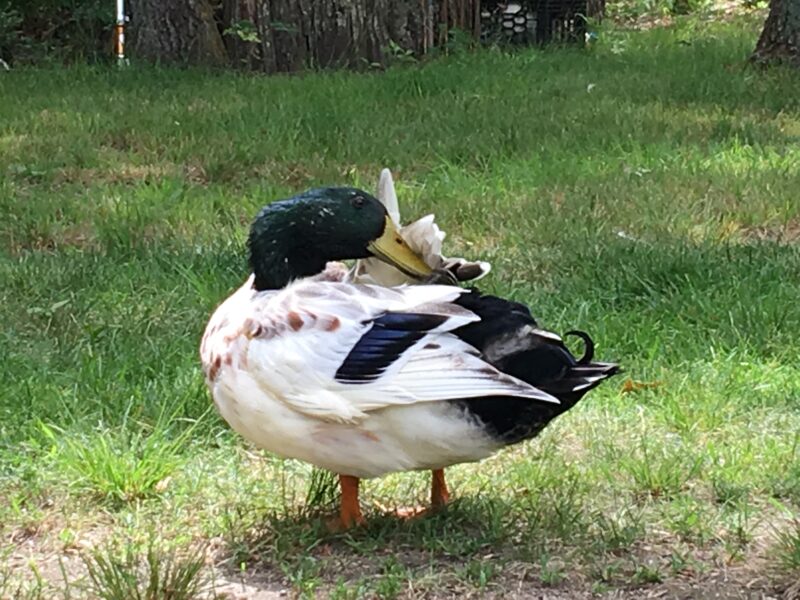
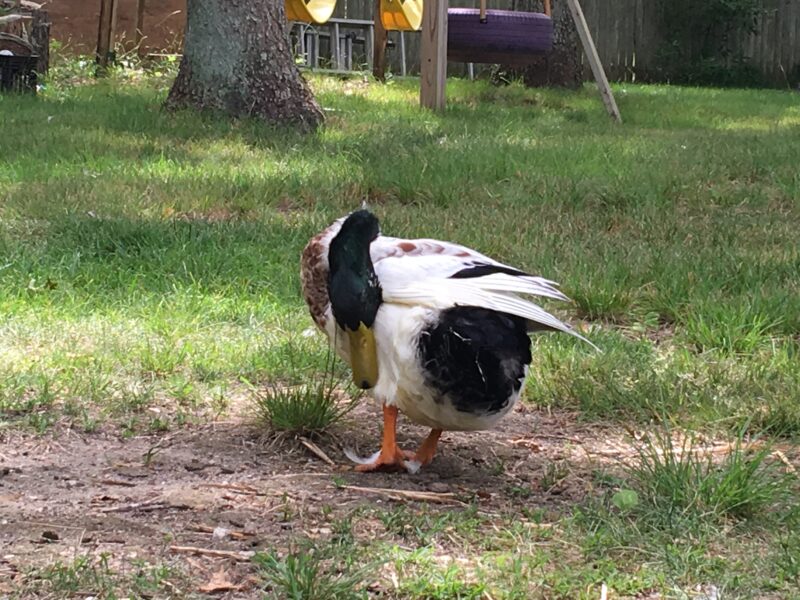
Bob their head up & down when they see me?
They love you! As we discussed earlier head bobbing is a form of flirting, but it is used for much more than that. Ducks bob their head up and down, often excitedly quacking when they are happy – when they see a duck friend they haven’t seen in a while, when they get some tasty treats, when their pool is fresh and clean, when they have a pool party with all their friends…..if you see a lot of head bobbing going on, you have a happy duck on your hands!
Bob their head over to the side?
This is a different kind of bobbing, not the happy up and down bobbing, but a grumpier looking side to side, usually with her head lowered. This is more of a reprimand and it’s usually done by one of the top female ducks. She might be reprimanding a lower duck for wandering off, but often it’s a warning to other females that this male is hers and you guys better back off my boyfriend. It’s also something she might do towards the drake of her fancy – claiming him in front of the other females but also as way of telling him he is the chosen one.
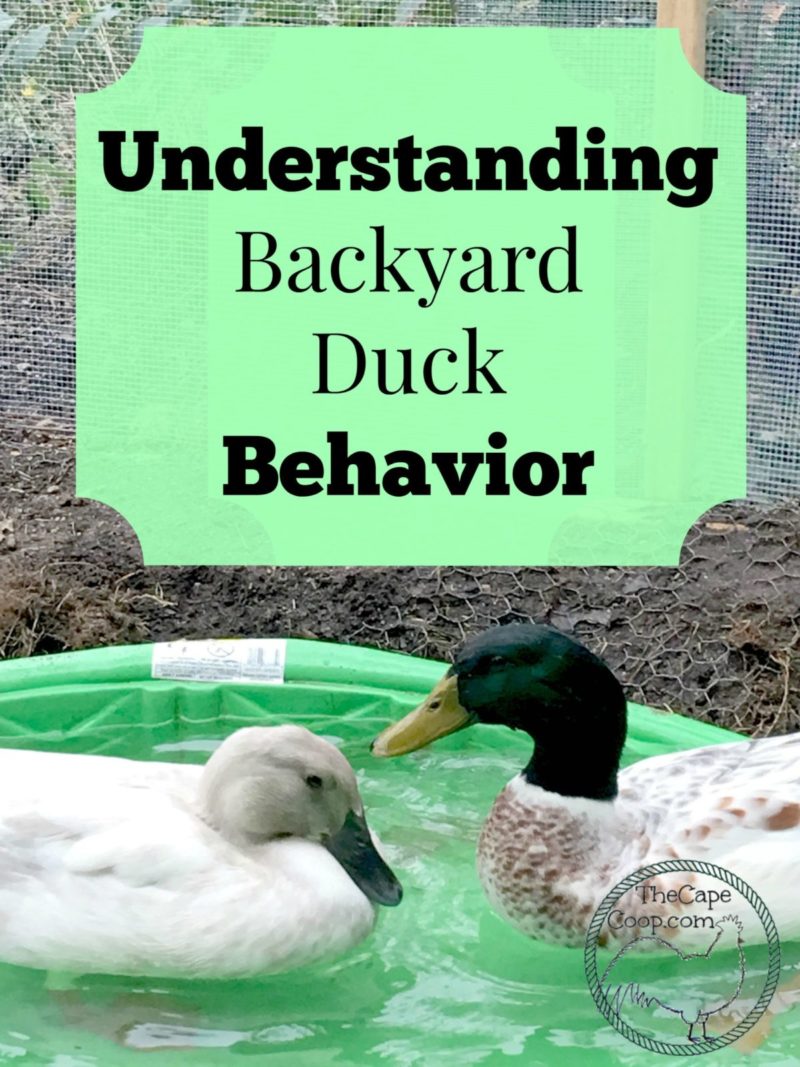
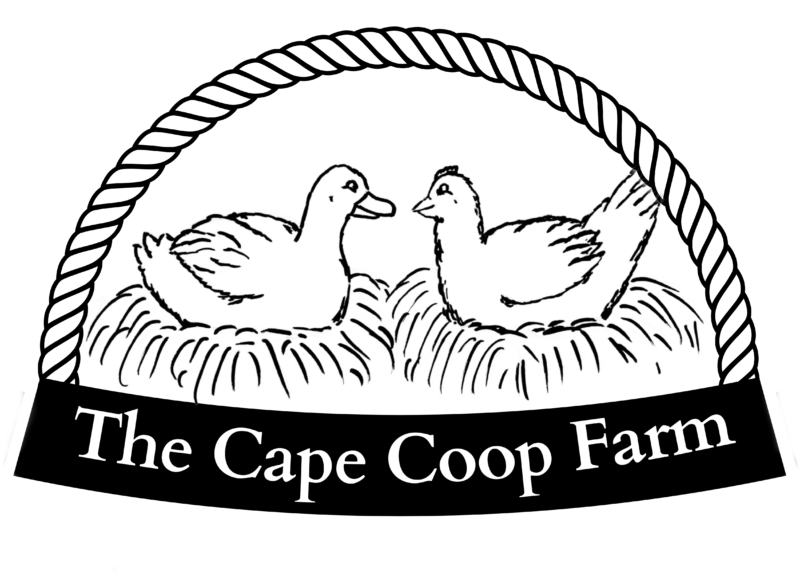
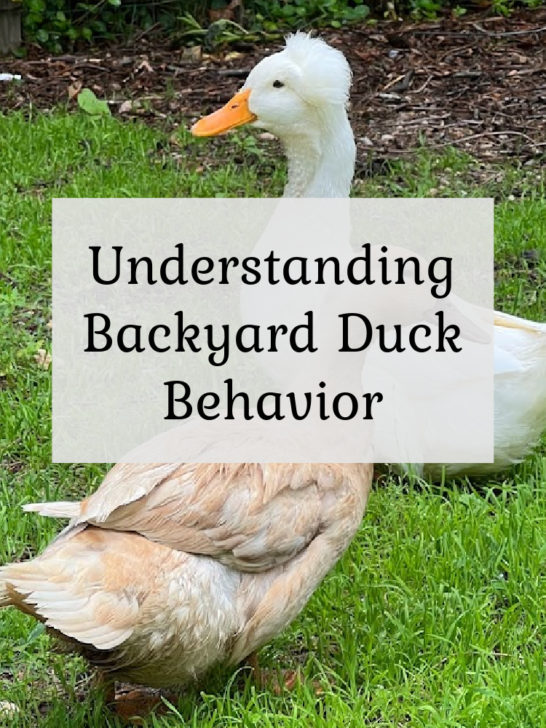

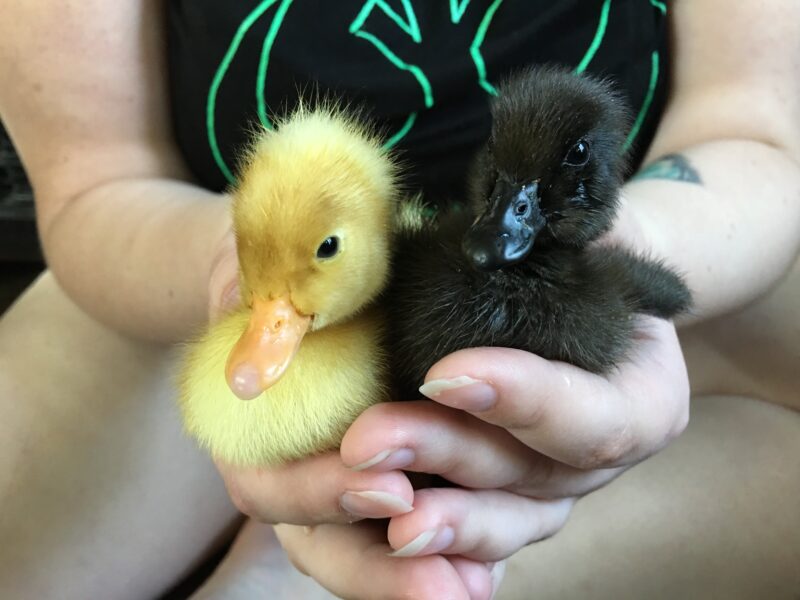
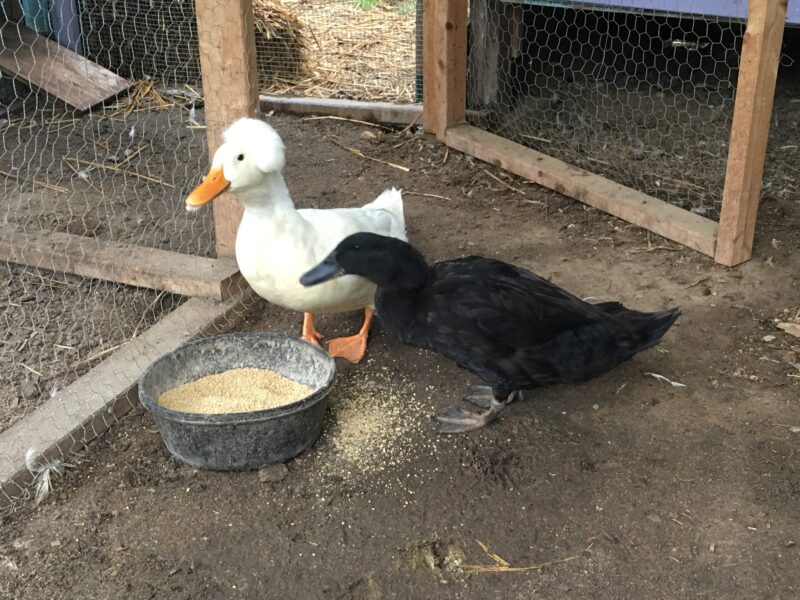
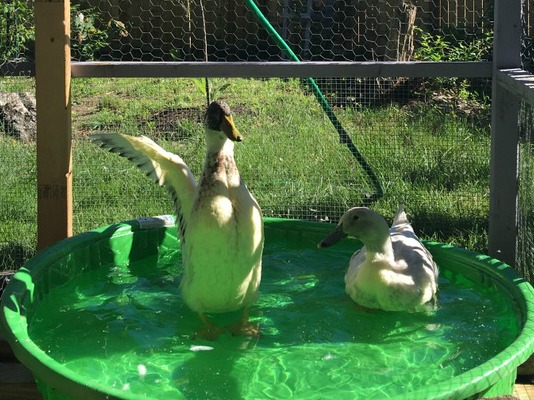
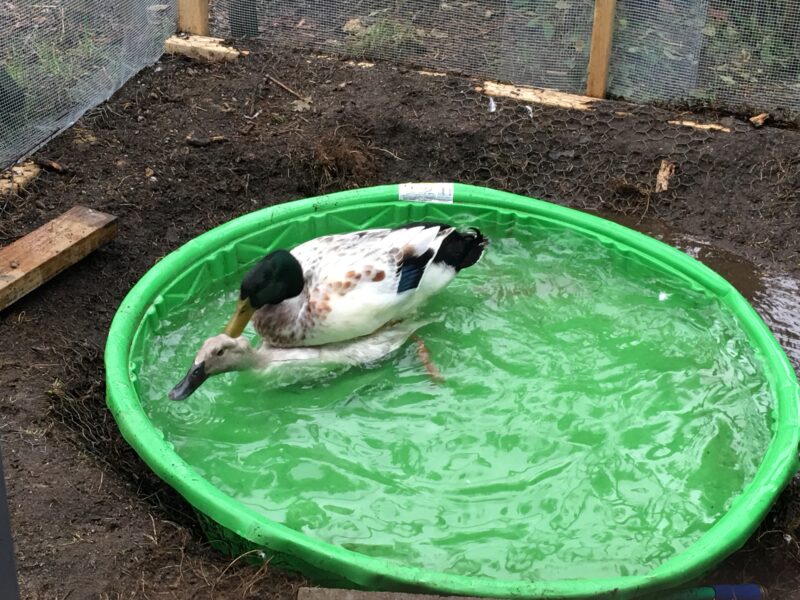
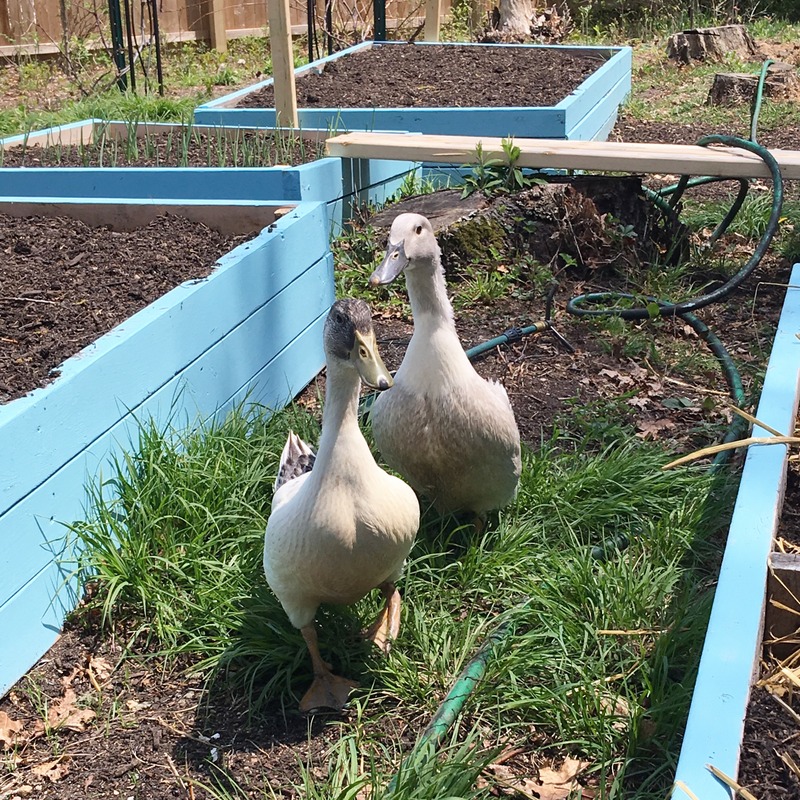
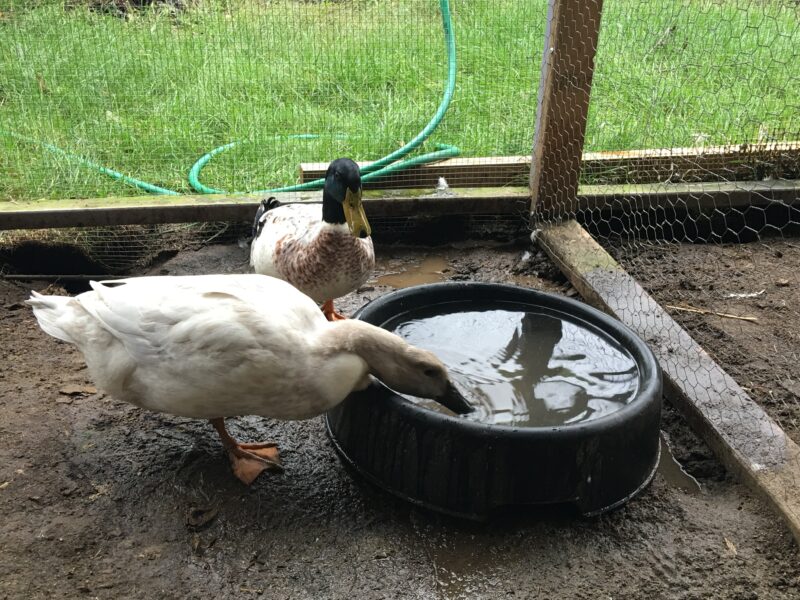
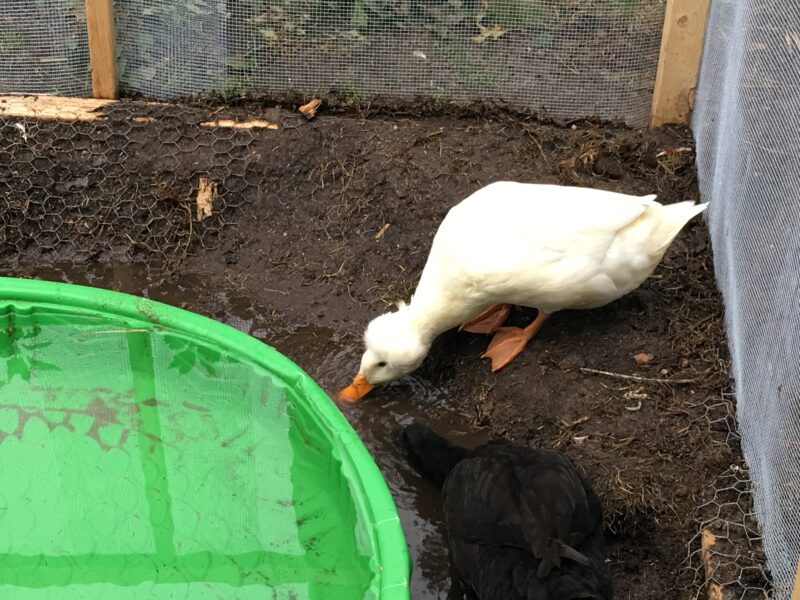
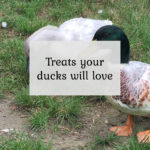


Joshua
Friday 2nd of May 2025
Hello,
So I have a question,
We have 3 females and 1 male, all 3 went broody, and 2 have had babies and 1 still on her nest.
We split the ducks up because the girls seemed to be upset with him getting too close and ran away from the male in the pool because he was trying to mate.
Now, my question is. The babies are nearly a week old, but every time I let the drake out, the girls go ballistic, they squat their neck down and run around quacking super loudly.
Are they upset he’s locked up and want him out?
Or are we doing the right thing for now keeping them separated?
He seems to hassle 1 female duck in particular and she wants nothing to do with him so that was part of the seperation because it seems like he is bullying her.
Thank you for reading and advice
Joshua
Liz
Tuesday 6th of May 2025
I would guess they are upset that he is around. Drakes typically don't have much to do with raising ducklings. They have even been known to kill ducklings if they feel like they are in the way of the mother duck wanting to mate. I think you are doing the right thing and I would continue to keep him separated until the ducklings are fully feathered and bigger (around 1 month old at least). Once they are together again, there will likely be a transition period with some squabbles as they reestablish a pecking order. The other thing you want to keep an eye on as the babies get older is that he isn't trying to mate with any of the females before they are about 4 months old. If they aren't full grown he can seriously injure them by mating. good luck!
Jason
Wednesday 11th of September 2024
I found one of my ducks nearly drowned and her wings and backside had been completely plucked of feathers. She unfortunately died in the night after caring for her. I've never had a problem in the past with my ducks and was curious if anyone has ran into something similar?
Liz
Wednesday 11th of September 2024
oh no that is horrible! do you have male ducks also? They tend to mate in the water and the plucked feathers could be extreme mating or possibly bullying damage.
Marnie
Thursday 25th of July 2024
Hi, we are having an issue with an aggressive duckling. They are about 3 weeks old from the same farm. Everything was fine and then one day one of the ducklings started going after one of the other duckling’s blood feathers causing her to bleed. We separated them for three days. Completely apart at night but in a separate enclosure within the duck enclosure throughout the day. We reintroduced them but after two hours it started up again. We aren’t sure if the buyer is male or female but the one getting bit is making female sounds. Do we keep trying to separate and hope space and time work their magic or just find a new home for the little vampire?
Liz
Wednesday 31st of July 2024
oh no that is horrible! Ducks and chickens unfortunately definitely like to pick on the weakest member of the flock, especially if there is blood. You might want to keep them seperate until the hurt duckling has totally healed. I would keep the hurt duckling in with the other ducklings so they can all bond, keeping the bully seperated. Then hopefully after a week or two living apart he will have learned his lesson. I would give him another chance, it could just be normal growing pains, trying to find his place in the flock. I hope things straighten out for you!
michelle
Monday 8th of July 2024
Hello! We are new duck owners and recently got 5 ducklings of different breeds for backyard layers/pets. All 5 are girls and arrived together. One is a khaki campbell, one duclair, a swedish blue, a buff and a cayuga. They are just now 6 weeks old and the khaki campbell has begun pecking and pulling out a feather all of the others when she gets near the water bowl or the little pool we have setup. It's been happening over the past week. Is this normal adolescent duck behavior or some bullying beginning? We have them in a large enclosure with a house and keep 2-3 water bowls there all day. The pool is across the yard, they only have access to it when we let them out to forage around the backyard 1-2 hours per day. The other ducks will get out of the pool to stay away from her when she pulls a feather, and will go to the other water bowl to avoid her. I've started adding a second pool to see if that helps to add more swimming area. Now they switch to the other one, back and forth to get away from the pecking. I'll keep trying to add to make sure they aren't feeling like they don't have enough. But, I'd prefer if the behavior would stop. I don't want this is escalate into any getting hurt. thanks for the help.
Liz
Wednesday 10th of July 2024
Yes this is normal behavior. They all need to figure out the pecking order for the group. Some bullying is to be expected as they sort things out - and even after that there will be occasional "reminders". Chasing, mounting, nipping is all normal. If any of them get injured or are bleeding you should step in and seperate the bully. But the fastest way to get this to stop is to let them work it out themselves.
Don I
Sunday 10th of March 2024
Hi Liz, I've observed a mother duck, followed by her ducklings, and when alarmed, the mother froze with her head down low to the ground and the babies followed this behaviour and did not move until the mother seemed sure there was no danger. It occurred to me that this might be the reason we call out "DUCK" when we need to keep our heads down. What thinkest thou? PS. I could not find any images of this behaviour any where.
Liz
Wednesday 13th of March 2024
hahaha! I've never thought of that! I have definitely seen that deer in the headlight type behavior when they are intently watching something. Definitely could be where the phrase comes from!